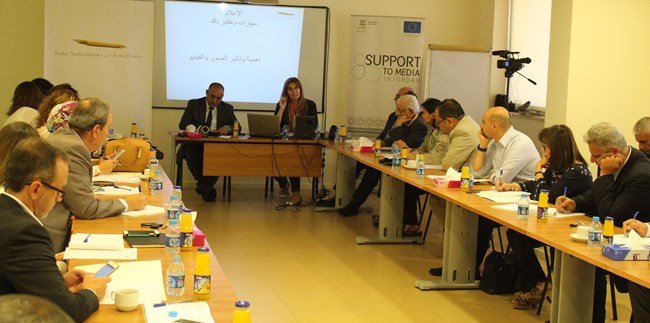Image:

02 Jun 2016
May 2016<br />
<br />
Jordan Media Institute (JMI) organized a focus group discussion on ways to integrate Media and Information Literacy (MIL) into the Jordanian educational system. The session brought together experts, academics and media leaders who expressed full support for the project which is being implemented by JMI in partnership with UNESCO and with funding from the EU.<br />
<br />
JMI Dean Basim Tweissi said at the start of the session that the project lies at the heart of JMI objectives to spread knowledge and support the media profession and provide skills to all sectors of society. He highlighted the importance of MIL in guarding people against negative influences of the media including misleading news and political propaganda and the use to different platforms to promote extremism. He explained that JMI will, in the long run, be looking towards implementing MIL programs targeting school and university students, women, decision makers and society in general. Tweissi said the project involves working with the Ministry of Education and the universities of Al Hussein Bin Talal in Maan and Aal al-Bayt in Mafraq. <br />
<br />
Senior Project Officer, UNESCO Support to Media in Jordan Project, Biljana Tatomir said UNESCO was privileged to implement the EU-funded project “Support to Media in Jordan”, which aims to enhance freedom, independence and professionalism for the Jordanian media. “MIL is one of the key components of the project and we are confident that partnering with JMI in the implementation of this component will be successful and of a benefit for various stakeholders in Jordan.” She added that MIL is a basis for enhancing access to information and knowledge, freedom of expression, and quality education. “It covers competencies that are needed to value the functions of media and other information providers on all platforms and evaluate and produce information and media content thus being vital for people to be effectively engaged in all aspects of development.”<br />
<br />
EU Representative Basma Al Nabulsi said the Support to Media in Jordan project aims at enhancing and bettering the enabling environment for the media sector stakeholders. She also expressed pride in the EU’s partnership with the Ministry of State for Media Affairs, UNESCO, JMI, the media sector and civil society.<br />
<br />
Senior Adviser at JMI Bayan Tal made a detailed presentation explaining the importance of photos, videos and text in communicating narratives and influencing individuals and institutions. She also used examples to stress the importance of MIL in helping people become aware of the media platforms and their diverse objectives, ownerships and funding, in addition to ways to help people produce media and become active participants in their communities. <br />
<br />
Former legislator Jamil Nimri stressed the importance of the project in helping young people acquire critical thinking skills so they don’t become easy targets for terrorist groups and ideologies, or even destructive thoughts. He suggested introducing MIL as a course in classrooms. While renowned academic Dr. Fayez Khasawneh said the concept should be introduced as an extracurricular activity, because the textbooks are overloaded with content. He stressed the need for the teacher training material to be developed by media experts. <br />
<br />
Former Minister of Culture Dr. Sabri Rbeihat supported integrating MIL into the curriculum but said the move should be preceded by a study of the nature of the targeted groups and the type of content they’re subjected to and their perception of that material. <br />
<br />
While the former Minister of State for Media Affairs Samih Maaitah said before agreeing on implementation mechanisms, there needs to be a decision on whether to integrate MIL into curriculum or introduce it as an extracurricular activity. He noted however, that extracurricular activities were less effective.<br />
<br />
The Director of the Curricula Department at the Ministry of Education Wafa Abdullat highlighted the importance of the project and urged a review of other countries’ experience and the nature of activities they adopted. She proposed introducing MIL as units in different subjects. The ministry Spokesman Walid Jallad said there was a difference between media literacy and educational media noting that the former was a set of competencies. He stressed the ministry’s readiness to cooperate on this project. <br />
<br />
Jordan Education Initiative CEO Nermine Nabulsi said media literacy was part of the 21<sup>st</sup> Century skills which also include teaching children critical thinking and analysis. <br />
<br />
Queen Rania Teacher Academy CEO Haif Banayan was also supportive of the project and stressed the importance of training teachers on MIL. He mentioned the upcoming regional Teacher Skills Forum, organized by the academy, as an opportunity to introduce MIL to the participants. <br />
<br />
Director General of the National Center for Culture and Arts Lina Attel said the Ministry of Education has been extremely responsive to organizing extracurricular activities for students, adding that Jordanian teachers were able and ready to receive MIL training.



